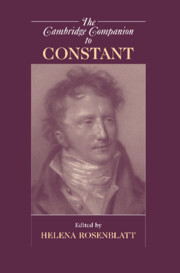Book contents
- Frontmatter
- Introduction
- 1 Benjamin Constant: Life and Work
- Part I The Political Thinker and Actor
- Part II The Psychologist and Critic
- 8 Constant and Women
- 9 Individualism and Individuality in Constant
- 10 Literature and Politics in Constant
- 11 The Theory of the Perfectibility of the Human Race
- Part III The Analyst and Historian of Religion
- Conclusion
- 15 Eclipses and Revivals Constant’s: Reception in France and America 1830-2007
- Bibliography
- Index
- Series List
9 - Individualism and Individuality in Constant
from Part II - The Psychologist and Critic
Published online by Cambridge University Press: 28 July 2009
- Frontmatter
- Introduction
- 1 Benjamin Constant: Life and Work
- Part I The Political Thinker and Actor
- Part II The Psychologist and Critic
- 8 Constant and Women
- 9 Individualism and Individuality in Constant
- 10 Literature and Politics in Constant
- 11 The Theory of the Perfectibility of the Human Race
- Part III The Analyst and Historian of Religion
- Conclusion
- 15 Eclipses and Revivals Constant’s: Reception in France and America 1830-2007
- Bibliography
- Index
- Series List
Summary
It is not to happiness alone, it is to self-development that our destiny calls us; and political liberty is the most powerful, the most effective means of self-development that heaven has given us.
“The Liberty of the Ancients Compared with That of the Moderns”This almost epigrammatic formulation conveys, I will argue, the essence of Benjamin Constant’s liberal philosophy. Even as a formula it is not simple. Although its basic terms - “happiness,” “self-development,” and “political liberty,” - may have to the contemporary ear the ring of ordinary language, they were for Constant terms of art, with their own historical contexts, problematic interrelations, and, not least, polemical thrust.
Perhaps the first thing to note about Constant’s claim is the relationship it proposes between a definition of the self and a theory of politics. Political liberty, for Constant, is not an end in itself but a means. He defends it here on the instrumental ground of its effectiveness in promoting the good of the self. Although the ostensible concern of the famous address is to reconcile ancient liberty, the ideal of political participation on behalf of the common good, with modern liberty’s celebration of individual freedom in the private sphere, Constant’s highest value is the individual self.
- Type
- Chapter
- Information
- The Cambridge Companion to Constant , pp. 206 - 224Publisher: Cambridge University PressPrint publication year: 2009
- 1
- Cited by



